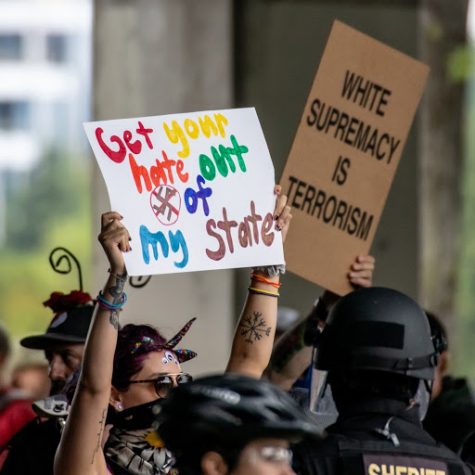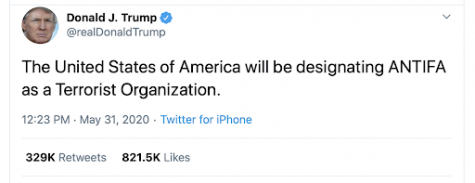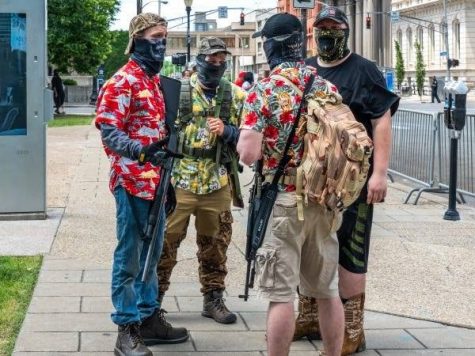A Brief History of Fascism
It was just 100 years ago that Benito Mussolini founded the Fascist party. A party which, to this day, promotes a damaging authoritarian, ultra-nationalism perspective.
Fascism has had different variations through the years but some things remain consistent; the promise to return to a mythic greatness and an escape from the corrupt, weak and feminized present, the creation of an enemy or a scapegoat whose elimination or domination will allow for those true, full members of society to thrive, and lastly, it attacks ideas, science and education in the name of a deeper, pure belonging.
Often, fascism has been delivered via dictatorial power, forcible suppression of opposition, as well as strong regimentation of society and the economy. Probably the most well known example of fascism in modern times is ‘The Axis’ of Italy, Japan and Germany against which WWII was fought.
Enter people who oppose this party and its principles, Anti-Fascists or ‘antifa.’ In a book written by historian Mark Bray in 2017, Antifa: The Anti-Fascist Handbook, Bray explained that antifa efforts really took hold in 1930 Nazi Germany, as a militant movement opposing the fascist Nazi regime. Toward the end of WWII, antifascist committees began to emerge with a revolutionary socialist bend.

It has been said that modern antifascism grew out of the punk scene in post WWII Germany after the fall of the Berlin Wall. However, antifascist movements are not exclusive to Germany. Where there is fascism, you will find antifa.
Antifa tends to only exist where fascism exists, which may help to explain why fascist regimes seek to demonize the opposition.
Ruth Ben-Ghiat, a history professor at NYU and the author of Strongmen: From Mussolini to the Present, explained this a bit in regards to Mussolini’s Italian fascism “when they needed to wipe out the political opposition, antifascists were first treated as terrorists and a special tribunal was created, as well as a special political police, to deal with them. At times they were lumped together with other ‘degenerates’ like alcoholics, petty criminals, the mentally ill, and others who were viewed as deficient and unable to be redeemed and normalized by the state.”
Labeling Anti Fascists as Domestic Terrorists
Not too long ago, the United States fought in, and helped win, a world war against fascism. Now, our sitting president considers it treasonous to be anti-fascist.
Antifascism is a threat only to fascism, and it only exists where fascism exists. While Trump himself may not be openly fascist, he has been known to take plays from the party. Like actively using divisive language to create a climate that is hostile to ‘others,’ while promoting a fervent national exceptionalism.

The truth is, Trump doesn’t have the legislative power to make it so. Further, antifa isn’t an organization but a loose knit network of people who actively oppose racist and authoritarian extremism by utilizing a variety of tactics. So even if his administration were to try to pursue this, it is likely antifa would not meet the requirements of the State Department.
“Identifying any domestic organization as a terrorist organization is problematic from a 1st Amendment “freedom of association” perspective, especially when they are not directly advocating violence,” Duval County Civics Teacher Alex Ingram said. “But it seems like a smoke screen to distract from the demands of the BLM protestors.”
Language matters, and it is noticeable that Trump typically doesn’t use the full term, antifascist, which serves to detach the group from its beliefs. This kind of attempt to shift the narrative away from issues of systemic racism has become a hallmark for the Trump administration.
This is perhaps most obvious when comparing Trump’s demonization of antifa to his general lack of a stance on the Ku Klux Klan, and seeming support of the anti-government ‘boogaloo’ movement.

Consider that protests with antifa elements may use direct action tactics that can be seen as ‘violent’ but ‘violence’ per se is not their MO, resistance to oppressive leadership is. Compare this to the fact that the Klan is well known as a far-right, racist organization that has inflicted gross damages on people of color since the 1800’s and the ‘boogaloo’ movement has been linked to at least five deaths, still openly organizes on Facebook, and shows up heavily armed to protests.
“The KKK isn’t criminalized or deemed terrorists in comparison to anti-fascists because the U.S.–since it’s very creation– has been a colonizing fascist regime, and the KKK works to protect and amplify that,” said a UNF alumni who wanted to remain anonymous. “There’s a long history of the police collaborating with and protecting white supremacists while imprisoning and assassinating Black and Indigenous liberation activists. Such collaborative violence was witnessed in Jax’s own bloody history during Ax Handle Saturday.”
Facing Fascism and Extremism in 2020
Recently, Inside Higher Education published an article titled Higher Education Needs Antifascism Now. The opening discusses how in these times ‘not being racist’ isn’t enough, one must be anti racist and goes on to say the same applies for fascism. “It’s not enough to say one is for freedom, one must also stand up and be actively anti fascist as fascism is a direct threat to freedom,” they write.
The article’s author, Michael Roth, continues with “just as now is the time to fight racism in our institutions, now the time has come to defend our very right to study, to critique and to create in peace. The time has come to become antifascists — while we still have the freedom to do so.”
___
For more information or news tips, or if you see an error in this story or have any compliments or concerns, contact editor@unfspinnaker.com.











